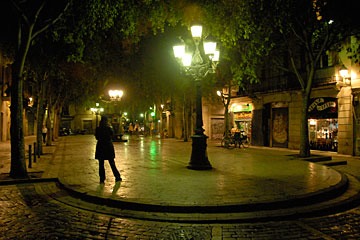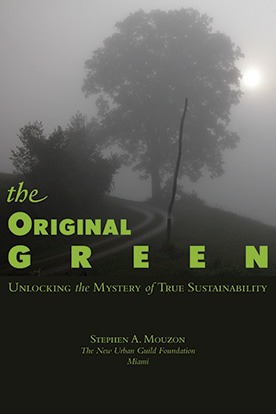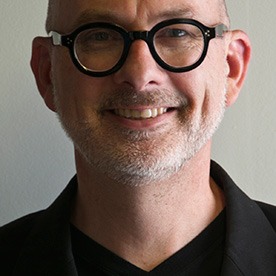search the Original Green Blog

The idea of retirement is undergoing its biggest change since the modern-day version was invented by Germany's Chancellor Otto Von Bismarck in 1883, and today's revision has profound implications for the shape of towns, villages, and neighborhoods. Retirement, for more than a century, has been advertised as a time to play… catch up on your golf game, or give tennis a try. Go for long walks in the countryside with your sweetie. We all know the drill, and it was very enticing. But there was a dark side nobody wanted to talk about. But first, let's look at how we got there…
The Era of the Company

Work was radically redefined at the beginning of the Industrial Revolution. Previously, most who had escaped servitude or slavery engaged in crafts or trades plied most often from their home or workshop. If they were successful, they might employ a few others who worked for them for wages, but the modern-day model of most of the workforce being employed by business or government is only about two hundred years old. During this Era of the Company, the corporation was the centerpiece of the economic lives of most of us. The virtues of this era were quality, speed, and economy… or "better, faster, cheaper," if you prefer. And two-thirds of that formula (faster and cheaper) was most often accomplished directly on the backs of the workers.
The result was a workplace that wasn't expected to be enjoyable, and it certainly wasn't anything approaching fun. If you're a farmer scraping out an existence on your own piece of land, then you do what you have to do in order to survive. But if you're working for The Man, then it's much easier to externalize the grind of working, and to get very unhappy about it. Roughly a century of labor wars ensued, until The Man finally wised up and realized that workers were much more docile when they received regular doses of play to go along with all that work. Today, the weekend is conceived as a time of play that compensates us for the workweek.
The Long Play at the End of the Day
It's easy to see how business and government came to conceive of retirement as a really long weekend: If we endure the workweek to get to the weekend, then maybe we'll endure a tiresome career for the promise of playing for the rest of their lives. It worked quite well… until now. But the sad reality is that the Long Play isn't usually so long for most of us, giving way to the dark days when, in those ancient words, "… I have no pleasure in them…" The unspoken dark side we all eventually discover is that the Long Play is just a sugar-coated prelude to death.
The End of an Era

The Era of the Company is jerking unsteadily to a halt today. The company as a vehicle for doing business won't end, of course, but companies are not going to be nearly so central to our lives as they have been. If you doubt that, try striking up a conversation with someone about your company (whether you're employee or management.) Chances are, they'll listen for all of three seconds. This is because we've all been vaccinated by spam, and have learned to hit the Delete key with lightning speed and to tune out anything that sounds remotely like a commercial. As a result, advertising simply doesn't work anymore.
The Age of the Idea
The sunset of the Era of the Company is occurring just as the Age of the Idea is dawning. While nobody wants to hear about your company anymore, they'll listen for hours if you've got a great idea. This may well be the biggest change in how we work that we've seen in the two hundred years since the beginning of the Industrial Revolution. Even the virtues of business are changing, from quality, speed, and economy to patience, generosity, and connectedness.
It should come as no surprise that this massive change will likely have a huge impact on the idea of retirement. While the full transformation isn't clear yet, it appears that we just might be dispensing with the illusion of playing "happily ever after" and replacing it with something more substantial.
The Search for Significance

Baby Boomers have just begun reaching 65, and will continue to do so for the next couple decades. This largest-ever generation that brought us Woodstock, the Summer of Love, and "agonizing reappraisal" was never content with just following the rules and punching the clock. And as they navigate further down the middle passage of life they, more than others that came before them, are looking for meaning in the time that remains. And that remaining time is likely to be significantly longer and spent in generally better health than either their parents or grandparents experienced. Second and even third careers will be a reality for millions of Boomers. Many realize that their first career might have been long on income but short on meaning, and vow to not make that mistake again. The pursuit of significance is likely to be top priority for them in the new work that they choose, even if their nest eggs have been badly battered by the Meltdown. Rather than retirement's prelude to death, these second and third careers are a continuation of life. Actually, they're more than that; they represent opportunities to be more alive than many Boomers ever were in their first careers. This time, they're determined to leave a legacy as they find deeper meaning in their new work.
Setting the Stage for Significance

Corporate office parks in the suburbs may have been the backdrops for countless first careers, but they will be abandoned to cries of "never again!" by almost all Boomers who once worked there because settings for unfulfilling experiences are seldom tolerated when seeking for the opposite. Instead, they will be looking for places that foster their search for significance rather than impede it.
Meaningful work depends on a number of things to which the setting can contribute. While some people are fortunate enough to know exactly what sort of work they may find meaningful, others must begin with a period of learning, and anyone pursuing significance overlays learning and work to some degree. Sometimes learning is structured, like going back to school. Other times, we simply learn things from the places we inhabit or the where we travel. In almost every case, however, meaningful work is likely to be more creative than the daily grind of the first career. Why choose something more mind-numbing than your first career instead of retirement? Most don't. They join the Creative Class instead. We'll take a look at various types of meaning these Boomers might be pursuing in greater detail in a subsequent post. But for now, let's consider the general characteristics of places that might best foster those second and third careers:

Vibrant walkable places where you can walk to many things are far better at stimulating creativity than the blandness of an office park. Because almost all second careers are more creative than the first, places like this with a large "cool factor" have a huge leg up on those that don't. Meaning found in unplanned ways is most fertile in places where people can get out and walk around on a whim, running into people, sights, or situations they didn't expect. Trips by car aren't usually quite so spontaneous. Leaving a legacy by purveying meaning to others can occur in many settings, but that meaning is more likely to spread broadly and unpredictably when the purveyor of meaning works in an accessible place like a storefront rather than being tucked away in an institution lost somewhere in sprawl. Connections between people responsible for so much of the transfer of meaning simply are more likely and vibrant in places that foster the connection of people. Sprawl, in contrast, wraps us in a couple thousand pounds of steel and glass known as the car, making the most common interactions on the highway the shouting that accompanies road rage. Which type of place would you prefer to work on that day when you finally have a choice?
~Steve Mouzon
Legacy Comments
Steve Mouzon · Board Member at Sky Institute for the Future
Check out my latest Original Green blog posts. It raises a number of questions about what you want to do once your first career is over.
Grant Humphreys · The Town Founder at Carlton Landing
Love the article Steve. Good insight and very fitting for Carlton Landing. I reposted onto my Facebook.
David High · Works at National Security Administration
Recently I've been thinking about how unquestioningly HR folks use the term "work-life balance". The term seems to imply that you don't have "life" when you are are at "work". I like your suggestion that we should be alive while at work!
Hazel Borys · Managing Principal at PlaceMakers
Well said, Steve!
Very interesting take. I'll be forwarding this to my parents.
Wanda Whitley Mouzon · Project Manager/Designer at Mouzon Design
Very insightful Steve! You really have this "nailed" I believe. Being a Baby Boomer myself, I can so relate to this! Going back to school after the age of 50; seeking something more creative to do; appreciating more and more the dynamic community that we live in, South Beach. And what is cool is that I feel very invigorated by the thought of honing skills in creative areas to like painting, drawing and design. This is a great time in life really!
Kaid Benfield · Senior Counsel for Environmental Strategies at PlaceMakers
Great post, Steve.
Chris Bradshaw · Oberlin College
Very sage insights, Steve.
I am into my 16th year of the 'second career.' Very satisfying. The point isn't whether we look to the weekend or 'retirement' for our reward, but that the work itself integrates the satisfaction and meaning as we go along. When we are older, there is no time for 'delayed gratification.'
Success in one's second career depends in part on starting it as a hobby before the first career ends.
Chris Bradshaw, Ottawa.
former leader, Green Party of Canada (part of second career).
Steve Mouzon · Board Member at Sky Institute for the Future
I just put up The Schooner Bay Miracle, about the new town of Schooner Bay in the Bahamas that took the worst Hurricane Irene had to offer with essentially no damage. And they did it using construction methods that would have been completely illegal in US hurricane zones: no houses on stilts, no hurricane windows, etc. We really need to reconsider how we build. Here's the link:
http://www.originalgreen.org/.../the-schooner-bay-miracle...
Here's the Schooner Bay Abaco Bahamas page as well.
Steve Mouzon · Board Member at Sky Institute for the Future
A post from Nancy Bruning for whom this comments module wasn't working recently:
Such a timely post, Steve! As a boomer, I feel I have come up with a particularly elegant solution, if I do say so myself. About 10 years ago, as a writer of 25 books on health and wellness, the irony of spending most of my time sitting at a computer did not escape me. I became a certified personal trainer, which fixed the sedentary, isolation problem. This eventually morphed into designing and conducting outdoor fitness classes in urban parks. We walk, or jog, and use nothing but our bodyweight, gravity, and the park furniture and features to perform stretching and strengthening exercises. I call it "Nancercize" and it's very Original Green in thinking, eh? Now, I'm training others to lead Nancercize groups, which anyone can do, with the proper training! I love helping others get just the right kind and amount of exercise while getting exercise myself--and getting paid to do it! For some ideas, check out my video, "101 Things to Do on a Park Bench" http://www.youtube.com/watch?v=tNBUWXQuCfI.
Boyd Lemon · Works at Freelance Writer
You are so right. I re-invented myself as a writer when I retired and now have 4 books on Amazon and other sites and another to be published this Spring on, of all subjects, retirement. My other passion is travel. I am having the time of my life in retirement, but it is something that needs planning (not just financial, but emotional too) and a slowing of the mind to adjust to not having a full time job to support yourself and family.
Boyd Lemon-Author of “Eat, Walk, Write: An American Senior’s Year of Adventure in Paris and Tuscany,” and "Digging Deep: A Writer Uncovers His Marriages," the author’s journey to understand his role in the destruction of his three marriages. Information and excerpts: http://www.BoydLemon-Writer.com.
Geoffrey Heard · University of Papua New Guinea
Excellent Steve. Lovely writing and a very pleasant site space too. How about these thoughts: http://pngtimetraveller.blogspot.com/.../what-does...
1,053+





